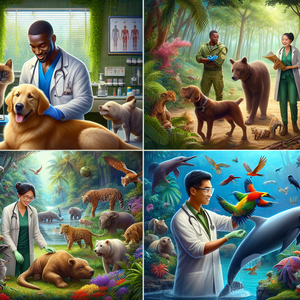The Secret Lives of Fox Professionals

Wildlife rehabilitators are the unsung heroes of conservation, working tirelessly to rescue and rehabilitate injured or orphaned foxes. Sarah, an Oregon-based wildlife rehabilitator, embodies this dedication. She recalls the emotional journey of caring for a young red fox who had been struck by a vehicle. "It was tough at first," she reflects. "But seeing him regain his strength and eventually return to the wild made all the sleepless nights worth it." Rehabilitators like Sarah often work long hours, emphasizing the emotional toll of their work. However, the satisfaction of restoring a life to the wild outweighs the challenges, illustrating the deep connection these professionals have with the animals they save.
Zookeepers: Guardians of the Species
Zookeepers are on the front lines of species conservation, responsible for the care and enrichment of foxes in controlled environments. Tom, a zookeeper at a wildlife park in Florida, shares his bond with a fennec fox named Zuri. "She has such a playful personality," he says. "It’s not just about feeding them; it’s about understanding their behaviors and creating an environment where they can thrive." Zookeepers also play a significant role in educating the public about fox conservation. By engaging visitors, they foster a deeper appreciation for these animals and the habitats they depend on. This dual responsibility of care and education underscores the critical role zookeepers play in the conservation landscape.
Conservation Biologists: Researching the Future
Conservation biologists are essential in understanding the challenges foxes face in the wild. Dr. Emily Chen, a conservation biologist focused on Arctic foxes, highlights the impact of climate change on their populations. "We’re seeing shifts in their migration patterns and breeding seasons," she notes. "Our research is crucial for developing strategies to protect them." By collaborating with governmental and non-profit organizations, conservation biologists like Dr. Chen implement effective measures to safeguard fox habitats. Their scientific research informs conservation strategies, ensuring that future generations of foxes can thrive in their natural environments.
Educators and Advocates: Inspiring Change
Educators and advocates play a pivotal role in raising awareness about fox conservation, particularly among youth. Lisa, an environmental educator, shares her passion for teaching children about local wildlife. "I use storytelling and hands-on activities to make the connection between kids and nature," she explains. "When they learn about foxes, they start to understand their importance in the ecosystem." These professionals inspire a new generation of eco-conscious individuals who recognize the value of wildlife conservation. By fostering a love for nature and an understanding of ecological interdependence, educators like Lisa help cultivate future advocates for foxes and their habitats.
The Intersection of Art and Conservation
Some professionals blend their love for foxes with artistic expression, using creativity to raise awareness and funds for conservation efforts. Filmmaker James, for example, creates documentaries that showcase the lives of foxes in their natural habitats. "I want people to see the world through their eyes," he states. "Film can be a powerful tool for change." Artists and writers draw inspiration from foxes, highlighting their beauty and ecological significance. By merging art with advocacy, these individuals contribute to the larger conversation about wildlife conservation, captivating audiences and motivating them to take action.
The world of fox professionals is rich with passion and commitment, filled with individuals dedicated to the care, conservation, and education of these captivating animals. From wildlife rehabilitators and zookeepers to conservation biologists and educators, each role is vital in ensuring that fox populations thrive in the wild. The stories of these professionals reveal the challenges and rewards of working with foxes, offering a glimpse into their secret lives. As we learn more about the efforts of fox professionals, we are reminded of the critical importance of protecting our natural world and the diverse careers that allow us to engage with it meaningfully. The future of foxes depends not only on conservation efforts but also on the dedication and passion of those who work tirelessly to ensure their survival.
Wildlife Rehabilitator
Wildlife rehabilitation centers, animal hospitals, and conservation organizations
Core Responsibilities
Rescue, rehabilitate, and release injured or orphaned wildlife, specifically focusing on foxes.
Conduct health assessments and administer medical treatments, including vaccinations and wound care.
Maintain accurate records of animal care and recovery progress, ensuring compliance with wildlife regulations.
Required Skills
Strong understanding of animal behavior and veterinary care; knowledge of local wildlife laws is essential.
Excellent communication skills to educate the public and collaborate with other wildlife professionals.
Physical stamina and emotional resilience to handle the demands of the job.
Zookeeper Specializing in Carnivores
Zoos, wildlife parks, and aquariums
Core Responsibilities
Care for a variety of carnivorous species, including foxes, ensuring proper nutrition, habitat maintenance, and enrichment activities.
Monitor animal behavior and health, reporting any changes to veterinary staff for further evaluation.
Engage with visitors to educate them about foxes’ roles in the ecosystem and conservation efforts.
Required Skills
Background in animal science or zoology, with specialized training in carnivore care.
Strong observational skills and the ability to interpret animal behavior.
Experience in public speaking and educational outreach initiatives.
Conservation Biologist Focused on Fox Populations
Research institutions, universities, and environmental advocacy organizations
Core Responsibilities
Conduct field research to monitor fox populations and assess the impact of environmental changes on their habitats.
Collaborate with governmental and non-profit organizations to develop conservation strategies based on research findings.
Publish reports and present findings at scientific conferences to advocate for protective measures and policies.
Required Skills
Advanced degree in biology, ecology, or a related field with a focus on conservation practices.
Proficiency in statistical software and field research techniques, including GPS tracking and habitat analysis.
Strong analytical and problem-solving skills to address conservation challenges.
Environmental Educator Specializing in Wildlife Conservation
Nature centers, educational organizations, and non-profits focused on wildlife conservation
Core Responsibilities
Develop and deliver educational programs about foxes and their ecosystems to schools, community groups, and visitors.
Create engaging learning materials, including workshops, presentations, and interactive activities.
Foster partnerships with local organizations to promote conservation initiatives and outreach efforts.
Required Skills
Strong communication and teaching skills with the ability to engage diverse audiences.
Knowledge of local ecosystems, wildlife conservation principles, and effective educational strategies.
Experience in curriculum development and public outreach.
Wildlife Documentary Filmmaker
Film production companies, non-profits focused on environmental education, and independent projects
Core Responsibilities
Research and develop documentary projects focused on the lives and conservation of foxes and their habitats.
Capture high-quality footage and audio, conducting interviews with conservationists and experts in the field.
Edit and produce films that convey compelling narratives about wildlife issues and conservation efforts.
Required Skills
Proficiency in video production, including filming, editing, and sound design.
Strong storytelling abilities to communicate complex ecological issues effectively.
Familiarity with wildlife behavior to ensure ethical filming practices and minimize stress on animals.


